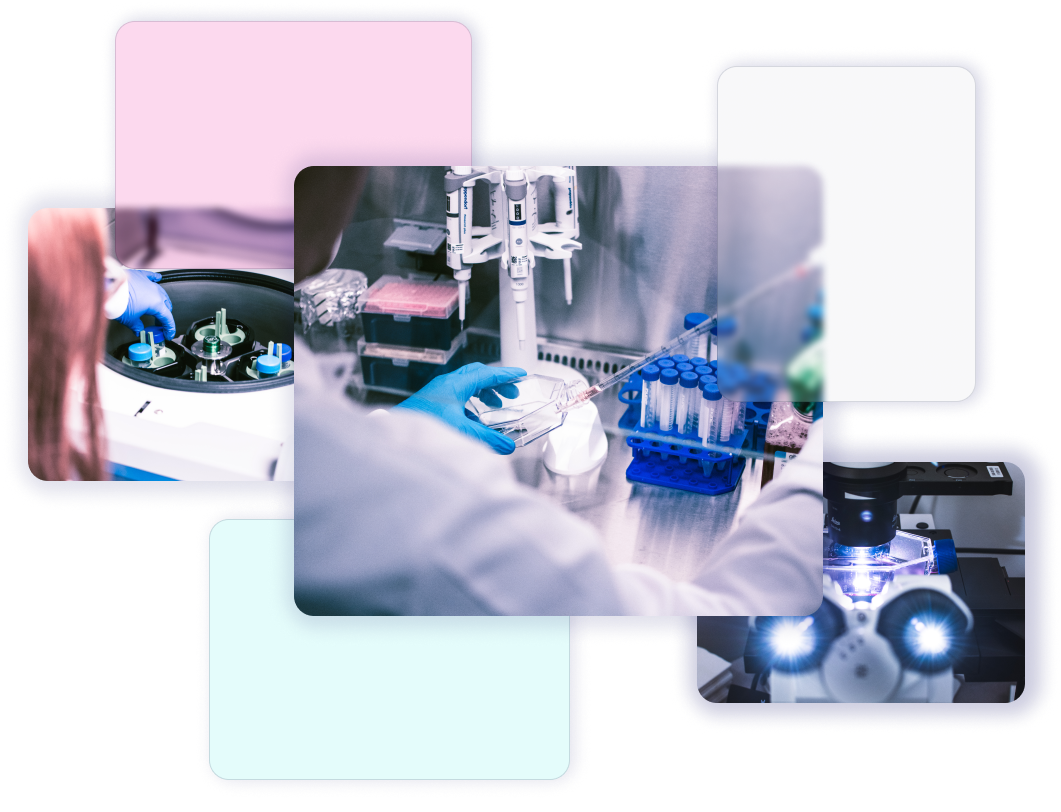Products and services
Breakthrough therapeutics take too long and cost too much to develop. Most fail before ever reaching patients. Sus Clinicals offers a better way. Our innovative Oncopig® platform uses genetically modified pigs to bridge the gap between mice and human trials. We create tumors and co-morbidities on-demand, allowing researchers to test drugs, devices, and diagnostics in a more predictive and cost-effective way.
Our products
Cell lines
Sus Clinicals maintains a biorepository harboring a range of validated primary and cancerous cell lines derived from the Oncopig cancer model. These pathogen-free cryopreserved cancer cell lines have been validated to be culturable for prolonged periods of time using standard tissue culture approaches. Information regarding culture conditions and typical culturable timeframes for developed primary lines is also available. Please inquire for questions about availability, characterizations, or to request development of cell lines representative of your cancer type of interest.
Available Oncopig cell lines:
- Primary Fibroblasts
- Transformed Fibroblasts (Soft-Tissue Sarcoma)
- Hepatocellular Carcinoma (HCC)
- Pancreatic Ductal Adenocarcinoma (PDAC)
- Primary Bladder Epithelial Cells
- Bladder Cancer (Urothelial Carcinoma)
- Primary Small Airway Epithelial Cells (SAECs)
- Lung Adenocarcinoma Cells
Genetically defined cell lines
In addition to our standard KRASG12D and TP53R167H driven Oncopig cancer lines, we provide custom engineered cell lines harboring additional clinically relevant driver mutational profiles and tracers. Genetically defined Oncopig cell lines are applicable for in vitro screenings, for example to verify pathway disruptions or gene/protein expression of target genes, in addition to targeted therapeutic screening. In addition, genetically defined Oncopig cell lines can be utilized for autologous orthotopic tumor induction in Oncopigs for in vivo studies. Please inquire for more information on how we can develop your mutational profile of interest.
Histology (digitized stains, unstained physical slides)
Sus Clinicals provides digitized histology slides and unstained physical slides to allow users to evaluate histologic and pathologic features of Oncopig tumors and other tissue types. Sus Clinicals maintains a biorepository of formalin fixed paraffin embedded (FFPE) Oncopig tumor and tissue histology blocks. In house histology capabilities allow us to provide digitized histology slides for stains and immunohistochemistry (IHC) targets of interest, antibody validation, and pathological interpretations. In addition, we provide unstained physical slides for customers to use for experiments at their facility of choice. Please inquire for information on tissue and tumor availability.
Fresh and Frozen tissues/liquids
Sus Clinicals provides digitized histology slides and unstained physical slides to allow users to evaluate histologic and pathologic features of Oncopig tumors and other tissue types. Sus Clinicals maintains a biorepository of formalin fixed paraffin embedded (FFPE) Oncopig tumor and tissue histology blocks. In house histology capabilities allow us to provide digitized histology slides for stains and immunohistochemistry (IHC) targets of interest, antibody validation, and pathological interpretations. In addition, we provide unstained physical slides for customers to use for experiments at their facility of choice. Please inquire for information on tissue and tumor availability.
Naive Oncopigs
Sus Clinicals provides naïve Oncopigs to customers interested in performing studies at their facilities. Oncopig litters are typically available every 5 weeks and ship at 8-weeks of age. In addition, Oncopigs can be held for longer periods of time if older/larger animals are preferred. Health screenings and veterinary health checks are performed regularly to ensure our Oncopigs meet high health standards for biomedical research facilities. Oncopigs are typically used for in vivo drug, device, or diagnostic testing following tumor induction (See Tumor Models section for information on currently validated tumor induction approaches). In addition, Sus Clinicals works with customers to provided Oncopigs and assist with development of induction strategies for model development studies. Please inquire for information on naïve Oncopig availability.
Tumor models
Sus Clinicals has validated the ability to induce a range of tumor types in the Oncopig. Tumor development is very rapid and reliable across tumor models, with tumors typically forming within 1-2 weeks, with sizes ranging from 0.5 – 2 cm in size. To ensure success of Oncopig studies, Sus Clinicals provides standard operating procedures for tumor inductions, in addition to standard Oncopig IACUC language. Training (virtual and hands-on onsite assistance) is also available upon request. Please inquire for further information on available Oncopig tumor models, or for information regarding status of additional models currently in development.
Available Oncopig tumor models:
- Bladder
- Colorectal
- Liver – Non-specific
- Liver – HCC
- Lung
- Pancreas
- Soft-tissue sarcoma (subcutaneous and intramuscular)
Cloud-based data storage
To address the needs of the growing porcine biomedical research community, Sus Clinicals has developed cloud-based database tools to enable easy access and sharing of porcine electronic medical records (pEMRs) and related datasets. This includes a pEMR system capable of storing data related to pig procedures, sample collections, and blood and tissue profiling results. Our cloud-based picture archiving and communication system (PACS) allows for sharing, visualization, interpretation, and annotation of digital imaging and communications in medicine (DICOM) images, such as CT, MRI, or angiography studies. Our pathology software provides similar benefits, allowing for sharing, visualization, interpretation, and annotation of digital histology slides. Sample management systems also allow for easy inventory, tracking, and searching of physical samples such as FFPE blocks, frozen tissue samples, and cell lines. Please inquire for further information on how access to these systems could help streamline your research efforts.
Our services
Compound screening
Whether you want to understand the effectiveness of your therapeutic across a range of species, or understand the metabolic profile of your marker or prodrug, Sus Clinicals has you covered. Sus Clinicals has capabilities to perform in vitro cell-based assays ranging from chemotherapeutic susceptibility, metabolic profiling, phenotyping, and immunocytochemistry. Analyses can be performed across rodent, Oncopig, and human lines to better understand species-specific differences and determine the model best suited for in vivo preclinical studies. We offer a wide range of solutions for your compound screening needs, including development of genetically defined lines for controlled testing of targeted therapeutic approaches. Please inquire for further information on how we can help with your screening needs.
Model characterization/evaluation
Are you interested in using the Oncopig but aren’t sure if it will meet your needs? We’re here to help! From confirming gene/protein expression, immune profiles, tumor vascularity, or imaging features, our team can work with you to make sure our models have the key features required for your study to be a success. If we don’t already know the answer to your questions, we can perform in-house studies or provide cell lines, tissues, and/or Oncopigs to determine the applicability of the Oncopig model for your specific need. Please inquire for further information on how we can help with your model characterization needs.
IR, endoscopic, and surgical device testing
The similar size and anatomy between pigs and humans makes pigs an ideal model for interventional radiology (IR)-based locoregional therapeutic studies, in addition to endoscopic and surgical device testing. Many clinicians have employed normal pigs for training or preclinical testing. The Oncopig builds on these experiences by allow for targeting of tumor nodules in a preclinical model of clinically relevant size. Utilizing the same instruments and imaging approaches used in the clinic, groups can test new catheter or ablation systems, embolics, locoregional therapeutic delivery methods, surgical devices, and procedural workflows prior to clinical trials. Please inquire for further information on how we can help with your preclinical locoregional therapeutic device evaluation needs.
Oncopig-based training
Following development and validation of novel devices, diagnostics, or other tools designed to improve procedure workflows and patient outcomes, the next major hurdle that has to be addressed is clinical adoption. While phantoms represent a standard training tool, this approach puts clinicians in a position where their first opportunity to evaluate new devices and tools in a live setting is a clinical setting. The Oncopig provides the unique opportunity to bridge the gap between phantom and clinical training schenarios, providing a live tumor bearing large animal model for clinicians to train and evaluate new technologies, increasing confidence and comfort before implementing in clinical settings.
In addition to improving clinical translation of new technologies, the Oncopig is an ideal model for residents or other trainees to get hands on experience performing surgical resections, endoscopic techniques, interventional radiology procedures, and more on a living animal prior to working with clinical patients. Please inquire below if you are interested in integrating the Oncopig into your clinical training programs.
GLP studies
We have capabilities to run GLP studies based on customer needs. Inquire to learn more.
Research & development
In addition to currently available products and services, Sus Clinicals is continuously developing innovative approaches to address preclinical research needs. Novel cell lines, cancer models, and modeling approaches are in development through internal, customer, and grant funded projects. If you are interested in any products, services, or models not listed on our website, please reach out at the link below. We would love to be your innovation partner focused on developing the platforms and solutions required to allow you to pursue your research uninhibited.

Frequently asked questions
Is the Oncopig FDA cleared?
Yes, the Oncopig has been cleared for use by the U.S. Food & Drug Administration. More information is available here.
What is your success rate for tumor induction? How much time does it take for tumors to form?
Our success rate for tumor induction in any test animal is 100%. We do typically induce in multiple sites, to ensure that at least one of the sites generates a tumor.
We typically see tumors of 1-3 cm within two weeks of the tumor induction procedure.
How do Oncopig tumors compare with their human counterparts?
Tumors generated in the Oncopig are virtually indistinguishable from their human counterparts. In blind examination by an expert pathologist, Oncopig liver tumors were identified as a human tumor. Histology, imaging and other assessment tools confirm that Oncopig tumors recapitulate their human counterparts.
In which organ systems does Sus Clinicals have experience with tumor inductions?
Oncopig tumors have been successfully induced in the following:
- Bladder
- Brain (glioblastoma)
- Colon/Rectum
- Kidney
- Liver (non-specific and HCC)
- Lung
- Pancreas
- Kidney
Can Sus Clinicals perform studies in compliance with Good Laboratory Practices (GLP)?
Generally yes. Sus Clinicals has an overall quality management system (QMS) and documented procedures in place to allow for conducting many studies under GLP. It is possible that procedures required for a specific study many not have yet been documented via our QMS, and thus would need to be codified and approved, which is generally possible depending on the client’s timing requirements. Note that additional charges apply for conducting studies under GLP.
What procedural experts are available for preclinical testing services?
In order to conduct a range of preclinical testing services via the Oncopig, Sus Clinicals has access to a roster of procedural experts, covering interventional radiology, pulmonology, urology and more. We also have ongoing veterinary care support.
What accreditations does Sus Clinicals have?
Sus Clinicals has master service agreements with top-tier research institutions, where we conduct preclinical testing services. We also partner with service providers for the breeding and care of our Oncopigs. All of these entities operate under their applicable accreditations or certifications, including the American Association for Laboratory Animal Science (AALAS), the Association for Assessment and Accreditation of Laboratory Animal Care (AAALAC), and the U.S. Department of Agriculture (USDA). All studies are conducted under appropriate Institutional Animal Care & Use Committee (IACUC) approvals.
How can I learn more about using the Oncopig platform?
Please contact our team and we can arrange an introductory call to discuss your research needs and whether/how our platform can advance your work.
